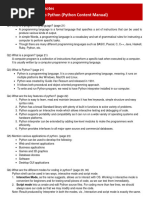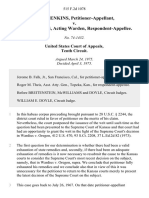0 ratings0% found this document useful (0 votes)
2 viewsPython Revision
The document provides a comprehensive overview of Python programming, including definitions, features, applications, and basic concepts such as variables, data types, and comments. It explains the use of functions like print() and input(), as well as the significance of tokens and keywords in Python. Additionally, it covers the modes of working in Python and offers examples to illustrate various programming principles.
Uploaded by
obulrCopyright
© © All Rights Reserved
We take content rights seriously. If you suspect this is your content, claim it here.
Available Formats
Download as PDF, TXT or read online on Scribd
0 ratings0% found this document useful (0 votes)
2 viewsPython Revision
The document provides a comprehensive overview of Python programming, including definitions, features, applications, and basic concepts such as variables, data types, and comments. It explains the use of functions like print() and input(), as well as the significance of tokens and keywords in Python. Additionally, it covers the modes of working in Python and offers examples to illustrate various programming principles.
Uploaded by
obulrCopyright
© © All Rights Reserved
We take content rights seriously. If you suspect this is your content, claim it here.
Available Formats
Download as PDF, TXT or read online on Scribd
You are on page 1/ 5
Python Revision notes
1 What is a computer program?
Ans A computer program is a set of instructions that a
computer follows to complete a task.
2 What is python?
Ans Python is a simple programming language used to
write a computer program. It isa easy to learn
programming language.
3 What are the applications of python?
Ans a) To develop games.
b) Build websites
c) Program robots using AI
d) Perform scientific calculations.
4 What are the features of python?
Ans a) Python is a programmer friendly language.
b) It is easy to learn.
c) Python is a platform independent language.
d) Python is an interpreted language.
e) It is an object oriented programming language.
f) Python is a case sensitive language
5 What are two modes of working in Python?
Ans a) Interactive mode-line by line execution of
command happens. there is no need to save file
while working in interactive mode
b) Script mode-complete program is written first
and then the execution happens. Saving
program is necessary before executing it.
6 What is the use of print() in python?
Ans print() function is used to display the output of any
command on the screen.
For eg. print(‘hello world’) will print hello world on
the output screen
7 What are variables? List rules for naming variables.
Ans Variables are containers for storing data values. A
variable is a named memory location that stores the
data and can be changed during the program
execution.
Rules for naming variables:
a) A variables name can only contain alphabets,
digits, underscore.
b) A variable’s name can be started with an
alphabet/underscore but can’t start with a digit.
c) We cannot use keywords as names of variables
viz print, int, float etc.
8 Multiple assignment of variables?
Ans a) Python allows a single value to be assigned to
multiple variables simultaneously.
Example x=y=z=1
b) We can assign different values to multiple
variables in a single line.
m1,m2,m3=12,15,18
9 Fill in the blanks:
a) Python is a high level programming language.
b) In the python IDLE we type and execute our
code in script area.
c) Executing a python script or code in the python
idle is called interactive mode.
d) A variables name can be started with an
alphabet or underscore.
e) int,print,for,if are examples of keywords.
f) Single line comments in python code are
written using the # sign.
g) Syntax refers to the rules to be followed while
writing a program in any language.
h) In the python code, we use indentation to
define a block of code.
i) In python code 90.87 is an example of float
datatype.
j) ‘\t’ and ‘\n’ are examples of escape sequences.
k) Program elements whose value remains to be
constant during the execution are literals.
l) Is Boolean a basic datatype supported in python
yes
10 What are comments? Explain type of comments in
python.
Ans Comments are used to explain the code. Python
interpreter ignores the comments.
a) Single line comment: they are written using #
(hash) sign.
Example:#this is a comment.
b) Multi-line comment: starts and ends with triple
quotes.
Example:’’’ this is a multiline comment
starts and ends with triple quotes’’’
11 What are tokens in python?
Ans The smallest individual unit in a program is called
token.
Python has following tokens:
a) Keywords
b) Identifiers
c) Literals
d) Operators
12 Define the following:
Ans a) Keyword: Keyword is a predefined word that
gives special meaning to the compiler.They are
reserved words which has predefined meaning
to the compiler.
Eg. False, if, True, print, int etc.
b) Identifiers: Identifiers are fundamental building
blocks of a program and are used to name the
programming elements such as user-defined
names, variables, modules and other objects.
c) Literals: Literals also referred to as constant
values are the data items that have a fixed value
like 345,suveer,76.97 etc.
d) Operators: Operators are special symbols used
for carrying out operations on variables and
values. For eg.
+ Addition
- Subtraction
* Multiplication
/ Division
% Modulus-it returns remainder as an answer
13 What are datatypes?
Ans The type of data stored in a variable is represented
by a datatype. For example person’s age is
represented as numeric value, name is stored as
string.
int(integer): it can store the integer values that can
be positive or negative like 43,5678,-987654 etc
float: it is used to store floating point values like 7.5,
89.67, -98.765 etc
str(String) : A string datatype represents a string of
characters enclosed within single or double
quotation marks.eg. “hello”,”123”,’book’ etc
14 Define input() function.
Ans The input() function is used to take input from the
user instead of assigning a fixed value to a variable.
Input function take input from the user as a string
and then convert it to required datatype.
For eg int(input(‘enter number’)) will convert
entered string into a integer.
15 Give use of following escape sequences:
Ans a) ‘\t’ :gives a tab space between two characters.
b) ‘\n’: this is called as newline character is used to
end a line and start a new line
16 Who invented python?
Ans Guido Van Rossum
17 What is the extension for saving a python file
Ans .py
18 What will be the output of ‘6’*’6’
Ans It will result in an error as 6 is written in single
quotes which is the syntax for writing a string and
strings cannot be multiplied.
19 What will be the output of 6*6
Ans 36
You might also like
- python programming question bank unit wise by Rupesh ✓No ratings yetpython programming question bank unit wise by Rupesh ✓24 pages
- 2324 Term1 Grade 7 - Computing Final Exam - Revision Sheet - AKNo ratings yet2324 Term1 Grade 7 - Computing Final Exam - Revision Sheet - AK16 pages
- Oral Exam question and answer Python ProgrammingNo ratings yetOral Exam question and answer Python Programming11 pages
- Namma Kalvi 12th Computer Science Chapter 5 and 6 Notes em 214847No ratings yetNamma Kalvi 12th Computer Science Chapter 5 and 6 Notes em 2148478 pages
- Namma Kalvi 12th Computer Science Chapter 5 and 6 Notes em 214847 PDF100% (1)Namma Kalvi 12th Computer Science Chapter 5 and 6 Notes em 214847 PDF8 pages
- Resource_20250121141100_unit-5_python-notesNo ratings yetResource_20250121141100_unit-5_python-notes3 pages
- Python Interview Questions Answers Free PDFNo ratings yetPython Interview Questions Answers Free PDF16 pages
- Class XI Q.Bank - Computer Science - All ChaptersNo ratings yetClass XI Q.Bank - Computer Science - All Chapters51 pages
- 80 Python Interview Questions & AnswersNo ratings yet80 Python Interview Questions & Answers23 pages
- IX Ch-2 Introduction To Python (Python Manual)No ratings yetIX Ch-2 Introduction To Python (Python Manual)4 pages
- question_bank_class_xi_cs_answer_to_be_uploaded-13No ratings yetquestion_bank_class_xi_cs_answer_to_be_uploaded-1345 pages
- Question Bank Class Xi Cs Answer To Be Uploaded-4No ratings yetQuestion Bank Class Xi Cs Answer To Be Uploaded-466 pages
- Virgil Jenkins v. Robert Atkins, Acting Warden, 515 F.2d 1078, 10th Cir. (1975)No ratings yetVirgil Jenkins v. Robert Atkins, Acting Warden, 515 F.2d 1078, 10th Cir. (1975)5 pages
- Risk Control For Biofuel Manufacturing FacilitiesNo ratings yetRisk Control For Biofuel Manufacturing Facilities32 pages
- Geographical Indications in India - WikipediaNo ratings yetGeographical Indications in India - Wikipedia8 pages
- DIVIDENDS ON PREFERENCE AND ORDINARY SHARES - Del RosarioNo ratings yetDIVIDENDS ON PREFERENCE AND ORDINARY SHARES - Del Rosario17 pages
- Land Rover Military Products 2012 - ENG - tcm291-88776100% (1)Land Rover Military Products 2012 - ENG - tcm291-8877623 pages

























































































